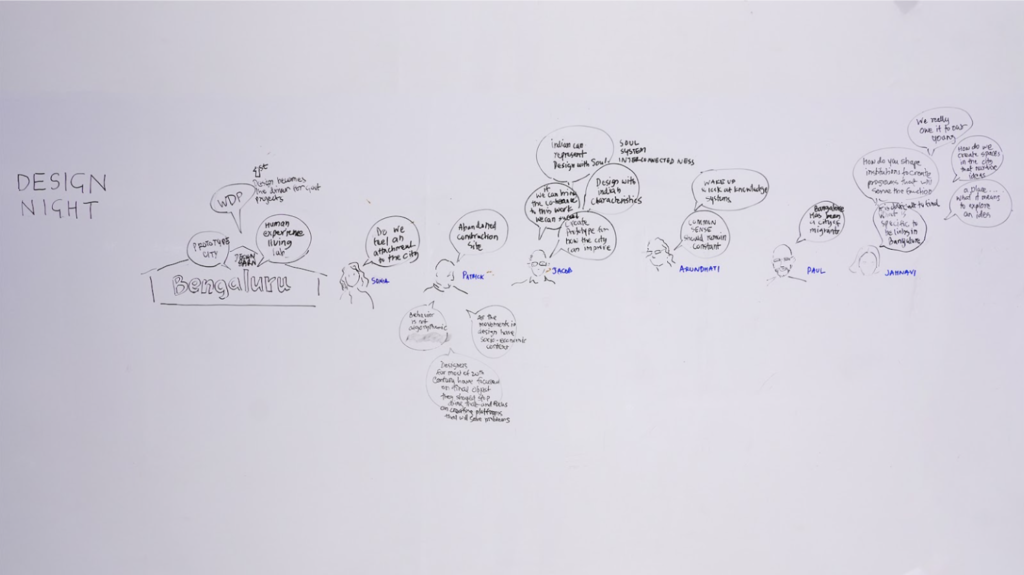
HUMAN X DESIGN X CITY
Design Night with Patrick Whitney
Published on 21 March 2024
Spread Design and Innovation was honoured to host Professor Patrick Whitney, one of the fathers of human centered design and strategic design at the Design Barn, Bengaluru on 13th 2024 for a Design Night.
What can design do to help the city of Bengaluru promote the well-being of its inhabitants? Thus shaping a more humane city vs just building infrastructure.
This was the provocation posed to Professor Whitney. The provocation comes at a moment in time when Bengaluru has been awarded the World Design Protopolis (WDP)™ status by the World Design Organisation (WDO). With Professor Whitney visiting the city to receive an honorary D.Litt from the Transdisciplinary University, Bengaluru, as a member of WDO, Spread seized the opportunity to create a conversation around Bengaluru, as the city gets ready to kickoff the World Design Protopolis programme.
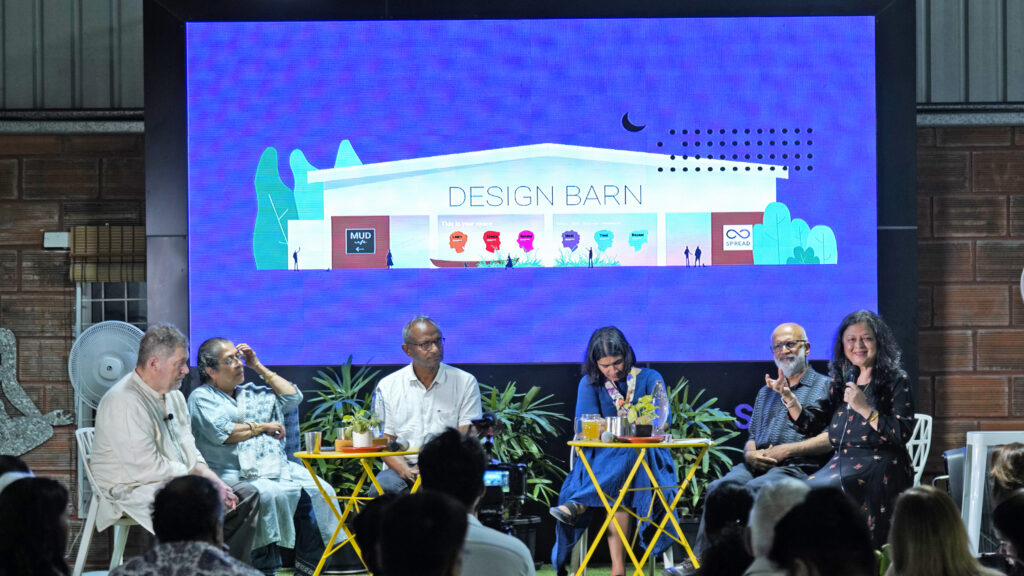
Design Night / 13th March 2024
The Design Night was a free flowing conversation with an audience of over 50 people, with some of the best minds of Bengaluru. The stellar speakers on stage featured Professor Patrick Whitney, Ms Arundhati Nag, Ms Sonia Manchanda, Mr Jacob Mathew, Ms Jahnavi Phalkey and Mr Paul Fernandes
Introducing the Speakers
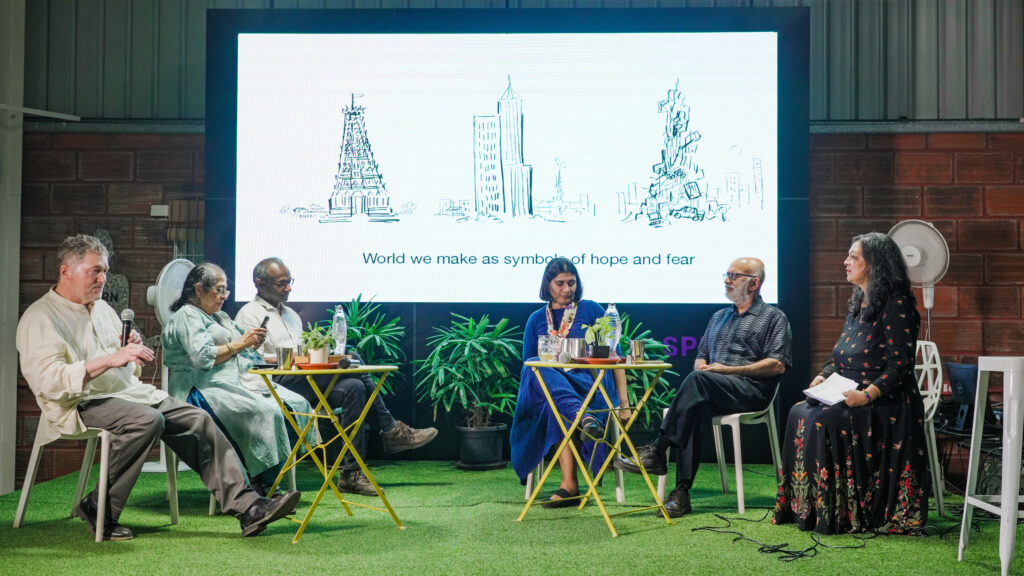
Professor Patrick Whitney
Professor Whitney is the recipient of the Lifetime Achievement Award from the Hong Kong Design Centre for bringing human-centered design and strategic design to Asia. Named a member of the “E-Gang” by Forbes for his work in human-centered design, he has served as Professor in Residence at the Harvard T.H. Chan School of Public Health, as co-founder and director of a design laboratory to bring design to Public Health. In 2023, this interdisciplinary agenda moved to Brown University, where he currently serves as a Professor of Practice.
Ms Arundhati Nag
Ms Nag has received several awards for her contributions to theater and cinema over the years, showcasing her versatility and talent in the performing arts.
Mr Jacob Mathew
Senior Design Principal at the Srishti Manipal Institute of Art, Design and Technology, Bangalore where he leads the Impact Edge Lab, Jacob looks at using business design to incubate and strengthen social enterprises. With immense experience in the world of retail, materials, new age tech and sustainable design, in the past, he has co-founded Tesseract Design and Idiom Design, Dovetail Furniture, Spring Health Water. He is an alumnus of the National Institute of Design.
Ms Sonia Manchanda
The Dream:in Project, an independent, individual endeavor by Ms Sonia that bridged academia and practice, received global recognition as a gamechanger with global participation and following, plus mentions in significant publications
She is a member of the India Design Council, is on the CII Design Council and is a Governing Council Member of Forge, an incubator in Coimbatore. She is also a trustee at Nrityagram, the only ‘dance village’ in the world.
Sonia graduated with a Masters in Design, Visual Communication and Film from the National Institute of Design, Ahmedabad.
Ms Jahnavi Phalkey
Ms Phalkey has been a Fellow at the Wissenschaftskolleg zu Berlin following which she joined the Science Museum London as external curator. An author par excellence, she is on the editorial board for the British Journal for the History of Science and History and Technology and director – producer of the 2020 documentary film Cyclotron.
Mr Paul Fernandes
Artist of the city, Mr Paul Fernandes is the creator of cartoons, illustrations and the art of storytelling. Paul is a proud old Bengalurean. His illustrations chronicle time, beautifully combining intricate details with a sense of nostalgia, transporting viewers to a bygone era. Nestled in the green neighborhood of Richards Town, Apaulogy, Paul’s gallery offers an unapologetic walk down the memory lanes of beautiful old Bengaluru.
Insights from the Design Night

Ms. Sonia Manchanda
“Bangalore is like a Human Experience Living Lab where diverse cultures come together and blend.”
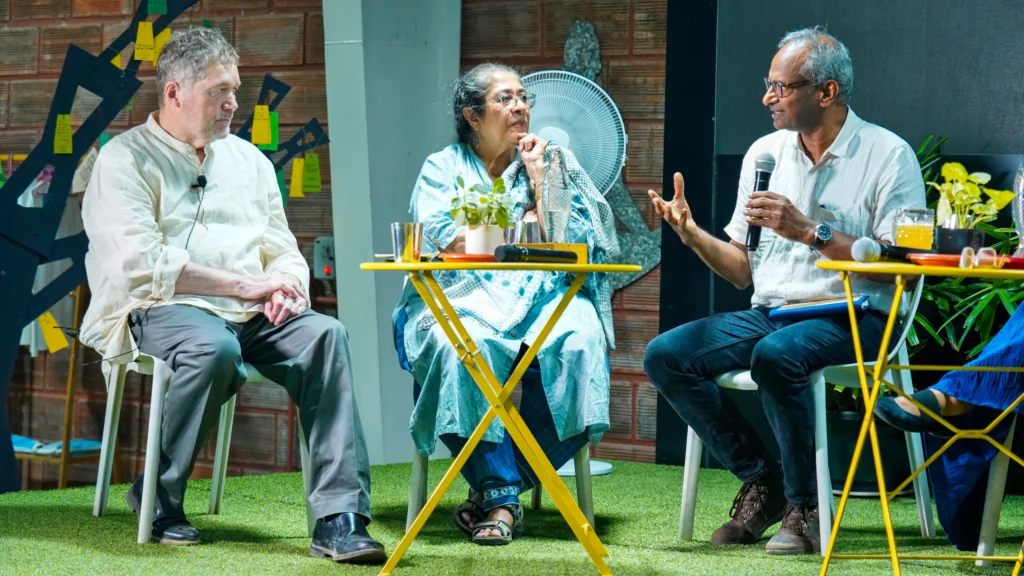
Mr. Jacob Mathew
“Italy is about style. Germany is about durable design. Switzerland is about precision. Japan is known for new technologies. India is about design with soul. In the Indian tradition each of us is God, we are part of God and we are interconnected. It is Soul, System and interconnectedness that creates new solutions.”
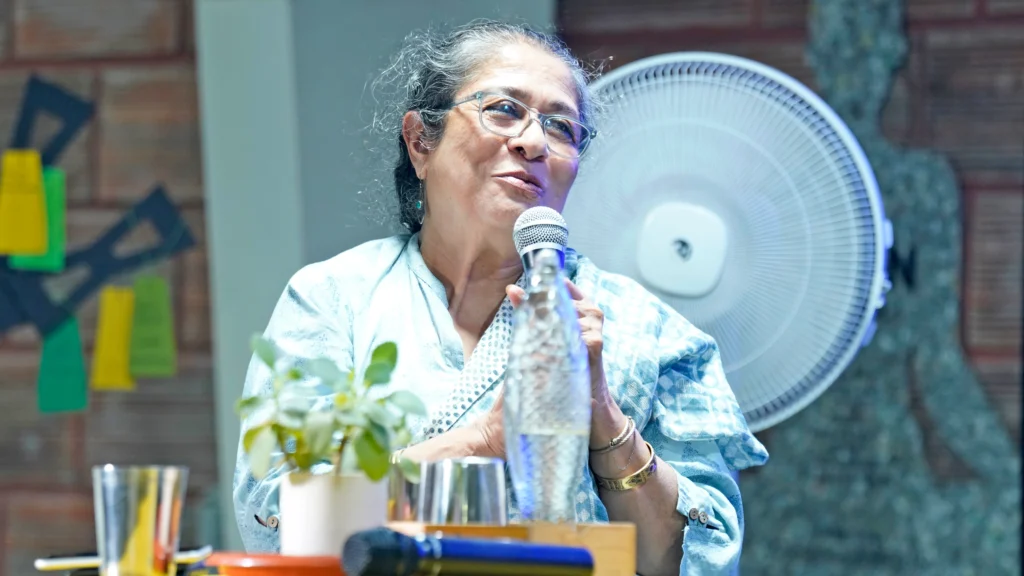
Ms. Arundhati Nag
“Common sense needs to remain constant. In our chase for design per se just as a kind of visual material we really give vacation to common sense. It is now time to wake up and look at knowledge systems which work for the planet.”

Mr. Paul Fernandez
“Today in 2024, the voice of the people is powerful and strident . Maybe the city is losing her voice.”

Ms. Jahnavi Phalkey
“How do you create in the public domain a space that to some extent returns you the joy of what it means to explore an idea or an experience? The responsibility that we have as collectively as different kinds of institutions adjacent to / in the domain of learning is to create a nurturing environment for the young adults so that they can find the resources and strength to access something new, to meet new people, to talk to someone who is not doing what they are doing. We owe it to the young generation.”
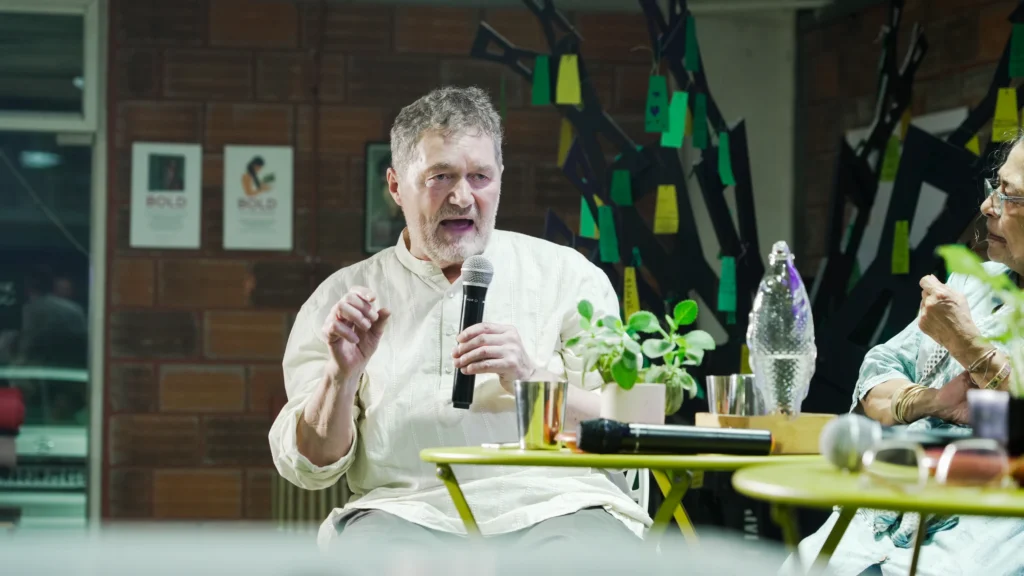
Professor. Patrick Whitney
“There’s this dream ; where we use words like Strategy, Creativity etc. thinking something would come out of that – all that’s bad news so far. Making interactive products or products that are coming out of Bangalore are examples of perpetrators that are making life faster but not as good as they should be. It’s because they don’t pay attention to the behaviour of people. Human behaviour is not algorithmic.”
While the conversation flowed on stage, Mr Sameer Tendolkar from LEAP illustrated the insights live on the big white board at the Design Barn.
As the evening unfolded, the audience eagerly immersed themselves in the dialogue, their curiosity sparking a flurry of questions that filled the air, creating a vibrant exchange of ideas and insights.
Question Hour
Q: How do you see the people of Bangalore change since the days of Auto Raja and Malgudi Days?
The question of contribution to Bangalore comes after a sense of ownership and that takes time.”
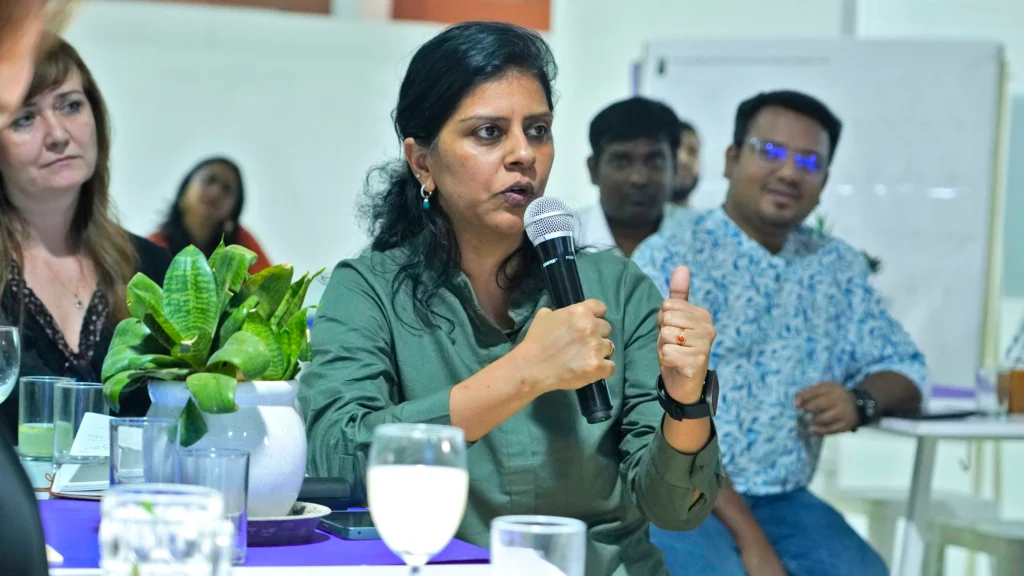
Q: If we increase the diversity in groups, for example designers, engineers, architects coming together, would it improve our future or cause more problems?
Ms. Jahnavi Phalkey: “Differences show up when you unravel each other’s minds but that’s a good thing because a fossilized mind is not a good place to feel alive. It’s a shrunken imagination where urban planners don’t understand people’s way of using water, ways of organizing their lives. When people from various disciplines come together that’s where the magic happens.”
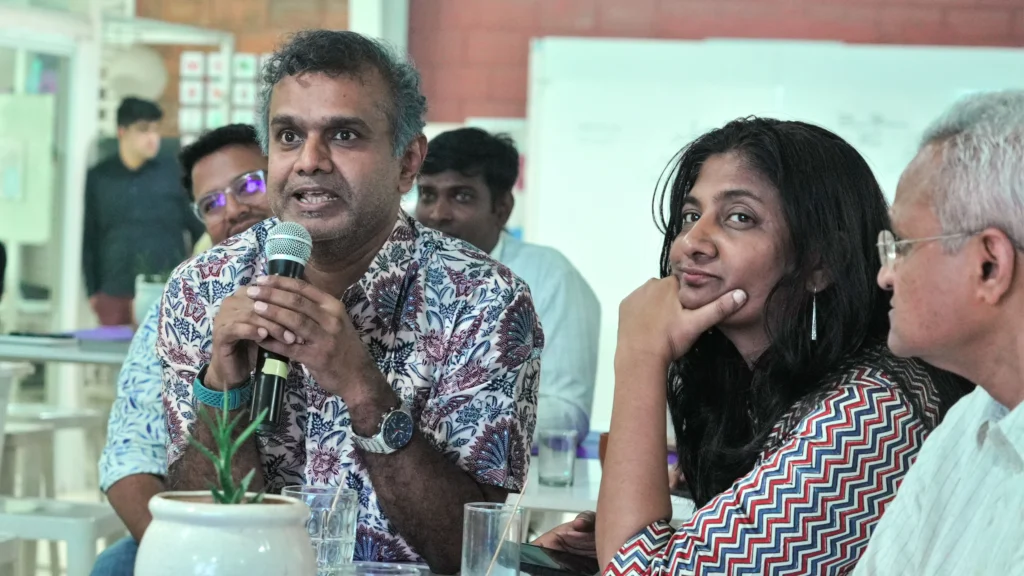
Q: How important is culture when you look at the design for a city to be futuristic and this cultural trade of constant reinvention and being with the time?
Professor Patrick Whitney : “Culture is the difference between thinking of doing something and what is normally done. By the time you figure out what Bangalore is, Bangalore will change. It’s a constantly moving target.”
Ms. Arundhati Nag: “Culture is really what you do after you close the bedroom door when nobody is watching. It is surreptitiously flowing under your skin, under the surface of the garbage city that we are becoming. It is up to us to cease the moment, nurture it and make it into a bigger moment for all of us.”
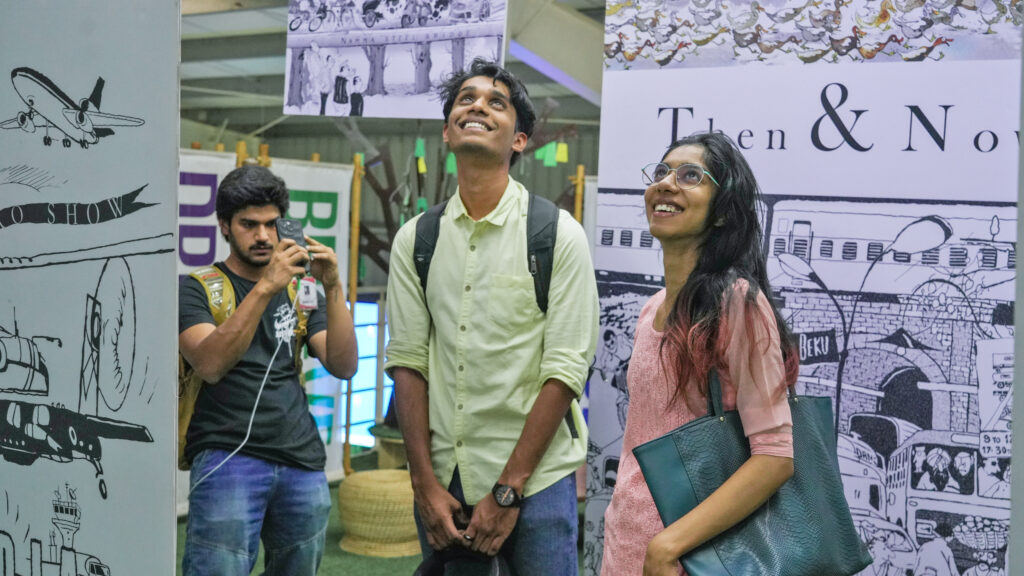
The evening ended with a walkthrough of Paul’s exhibition Bangalore Then and Now with the artist, a networking dinner and many moments of shared laughter and camaraderie.

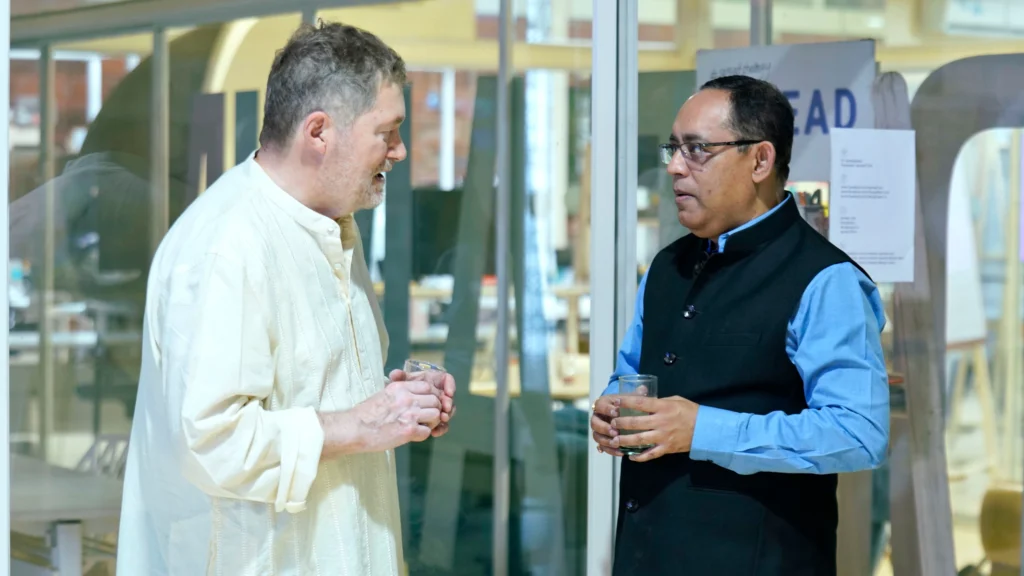
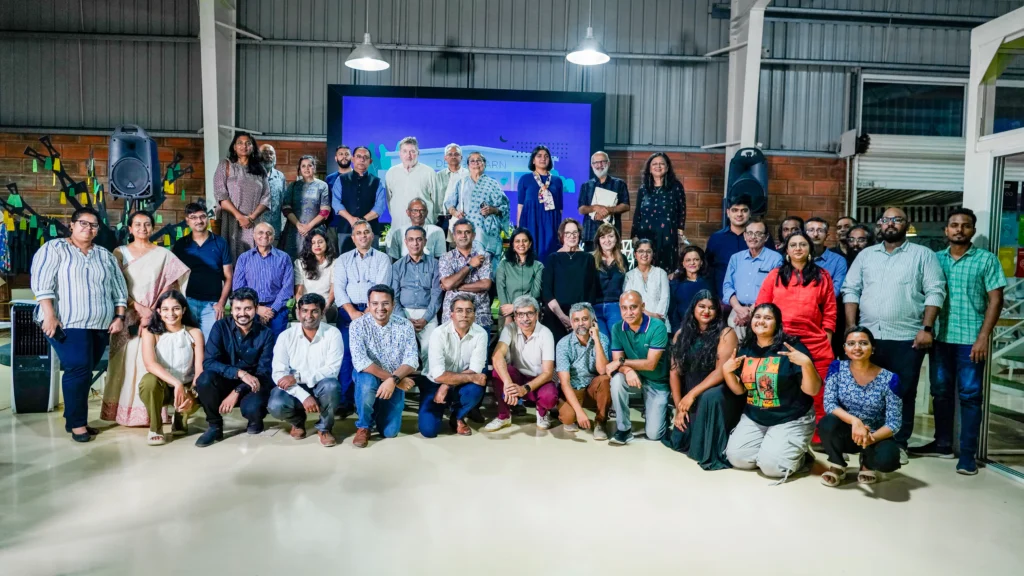
SPREAD DESIGN AND INNOVATION
Spread Design and Innovation is a transdisciplinary design, media and technology organization. The Founders and team have thirty plus years and over six lakh man hours of experience in shaping large businesses, leading change projects, designing significant brands, physical and digital experiences, campaigns and films.
World Design Organization (WDO)®
Spread is a member of the World Design Organization (WDO)®, a globally recognized non-governmental organization that aims to promote and advance industrial design and its power to enhance economic, social, cultural and environmental quality of life.
SPREAD DESIGN AND INNOVATION
The World Design Protopolis (WDP)™ is a new programme that will support the creation of solutions-based initiatives to address key development issues globally and will work to empower communities with the design knowledge and resources required to initiate projects that improve quality of life. At a time when the challenges facing the world’s cities grow increasingly more complex, World Design Protopolis represents a significant expansion of WDO’s existing programme roster and mission of design for a better world.
